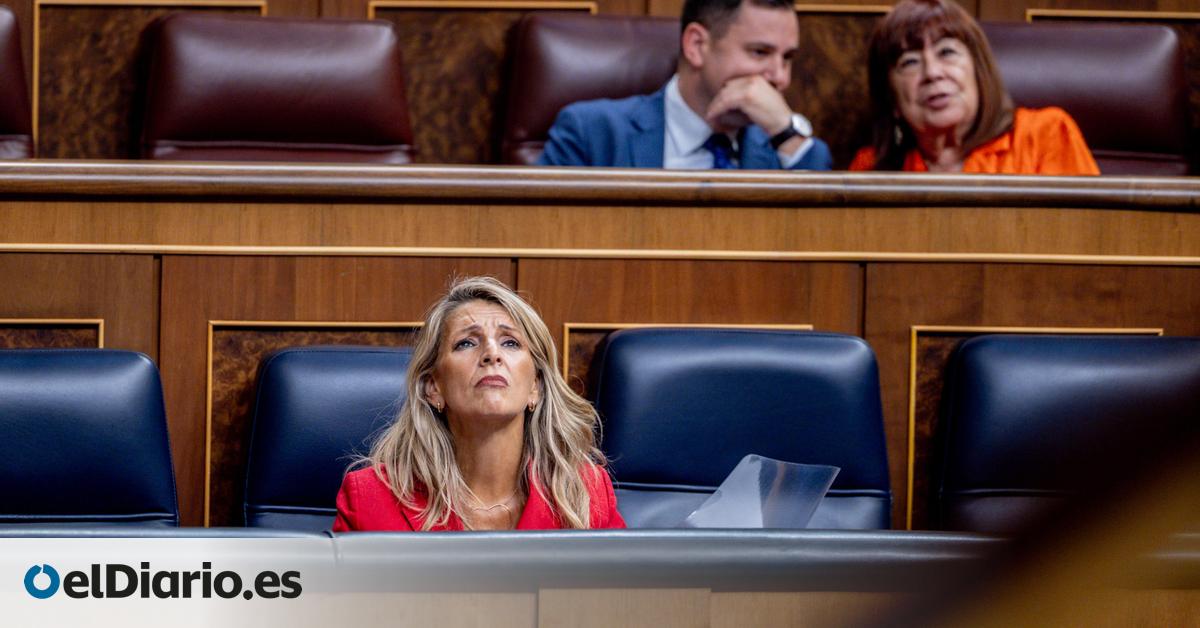
Another coup from the government. And again sounded. The Catalan independentistas will unite their votes in Congress on Wednesday to those of the PP and VOX to make the first of the workday of the current 40 hours at 37 and a half hours at 37 and a half hours. A measure that would benefit 12 and a half million workers and that was not only the flagship of the legislative agenda of the Ministry of Labor, but one of the most ambitious reforms of the government for what remains of the legislature. Although Yolanda Díaz preferred on Tuesday to point to the PP and not those of Puigdemont, Junts accused her of “deceiving” citizenship and putting the welfare state at risk.
“Forcing to comply with the reduction of the day to those who cannot assume it puts the welfare state at risk. They stop deceiving people. What they are doing is putting everyone’s future because they do not explain who is going to pay all this,” said spokesman Míriam Nogueras, who appeared in Congress to explain the position of their group in their usual hard tone against the Executive.
Nogueras, in fact, accused Yolanda Díaz’s team to use blackmail and threat during a negotiation in which he denied that they would never have even produced approaches. “We have been very honest. The Spanish government knew our position from day one. We are in favor of the reduction of working hours, but also to maintain the welfare state. And some measures put it at risk. When the culture of the effort disappears, impoverishment begins,” he said in full tune with the most right -wing discourse of formations such as the PP or Vox.
The version of the Ministry of Labor, on the other hand, is very different. From the Executive they explain that during the negotiations, which have intensified in recent days and that they extended at the highest level until the same afternoon, there were proposals and opposite that led to an approach. In this exchange of initiatives, for example, millionaire aids to small and medium -sized companies that prove difficulties in implementing the reduction of day were raised. And even more strictly political aspects were approached, such as the delegation of certain competencies in labor matters.
According to current sources of the conversations between the Juns dome and the Ministry of Labor, the Catalan independentistas had even worked on a final proposal to unlock the negotiation that in the Yolanda Díaz team were willing to study. But everything changed after the meeting of the Junts executive this Monday.
The secretary general of the independentists, Jordi Turull, was in charge of communicating to his interlocutors that the decision of the dome of his party was immovable and consisted of maintaining his amendment to the totality of the bill to reduce the day, which in practice directly prevents even his parliamentary processing. In the Ministry of Labor they point out that the argument offered by Turull is that the Government maintains many without compliance, in reference to the amnesty to Carles Puigdemont or the official of Catalan in Europe.
That the Junts portz arrived just after the meeting of the executive of the party and not within the framework of the negotiating teams and that they have not even allowed the rule to begin its journey in Congress to give opportunity to a subsequent negotiation, he installed this week in adding the conviction that it is expressly a more political position than in the background. As much as the speech of Puigdemont is nailed to that of the Spanish employer and also the Catalan.
“This debate is main, it is one of the most important norms of the legislature because 43 years ago the working day is not reduced. People have the right to live a little better. And this goes on which side each one is. The Government and the Ministry of Labor are on the side of the working people of our country,” said Yolanda Díaz in the halls of Congress.
The second vice president called mobilization in the streets and promised to work to recover the norm in the future, although she did not specify how or when. “There will be a parliamentary defeat, but there are losses that win on the street. I release a message of hope, a call to the working people to go to the streets to defend their rights. When a rule is in favor of the people there are no wind or there are no rights to stop it,” he said after dodging the reproach to Junts and pointing to Feijóo. This Wednesday, mobilizations convened by UGT and CCOO are planned at the gates of Congress.
In Moncloa, where they assume the parliamentary defeat on Wednesday as a setback, they prefer at the moment to subtract political significance to the attitude of JUNTS beyond this concrete norm. In fact, executive sources assure that the interlocution with Carles Puigdemont is permanent and that it has been reinforced after Salvador Illa’s visit last week to Brussels. And they point out that after Junts formalized his rejection of the working day, Puigdemont himself sent signs that this was not a definitive portazo to the legislature but something punctual. “The budget folder is completely different from that of the working day,” said Nogueras during his appearance.
Expansion of maternity and paternity permits
On the other hand, the Congress validated on Tuesday another of the most relevant measures of the social agenda that the Government had pending to carry out after the summer: the expansion of permits by birth and care of children.
The Executive approved in July, pressed by a fine of Brussels and after an intense pull and loosen among the partners, the Royal Decree Law that extends until 19 weeks – two of them available during the first eight years of life of the child – these paid periods. A time that arrives until 32 weeks in the case of single -parent families. This Tuesday he got the majority support of the lower house.
“This measure will benefit almost a million people this year who will have more time to be with their own and less overwhelmed in their lives,” said the second vice president of the Government and Minister of Labor, Yolanda Díaz, during his word shift. In his speech, who has led the negotiations in favor of this extension has assured that it is a “state of state that transcends the partisan controversy.” “We do not talk only about weeks or precepts, but about the real life of the people,” he had settled.
Unlike with the reduction of the working day, the government faced the vote of this royal decree with some certainty that it would go ahead. And although they finally gave the numbers, most of the investiture members who supported the validation – Bildu, Junts, ERC and PNV – did it with some criticisms that reduced the intervention of Díaz: at paid weeks, which are less than those that the coalition executive had promised, and the retroactivity set in the norm, which limits the paid permission to the children born to the children. August 2024.
The measures contained in the Royal Decree entered into force after publication in the Official State Gazette a month and a half, without waiting for the text to be endorsed in Congress. The Government opted for this procedure to avoid paying a fine that imposed Brussels for the breach of a European directive precisely on part of these permits that should already be adapted to the Spanish order. However, the Court of Justice of the European Union (TJUE) sentenced Spain to pay six million euros. The procedure had begun in 2022.
Source: www.eldiario.es

